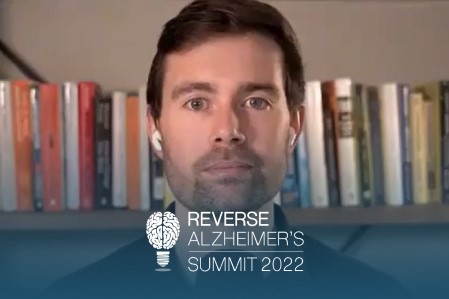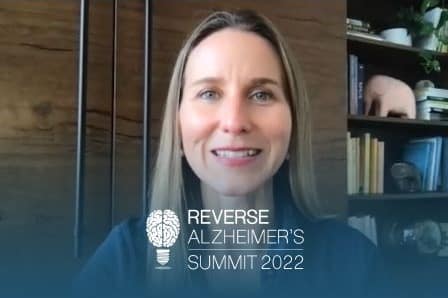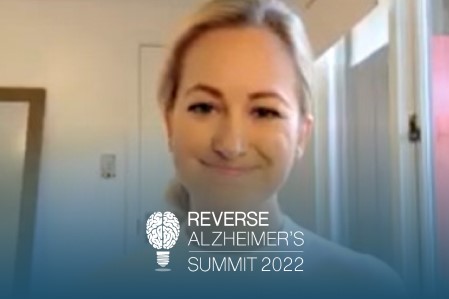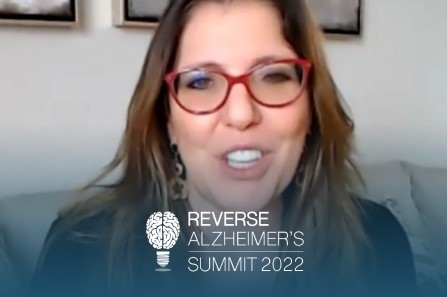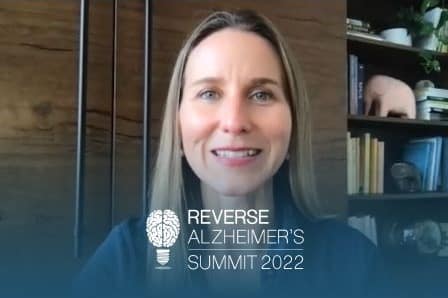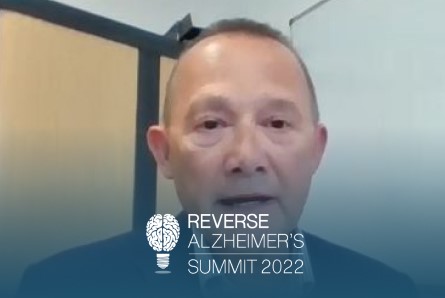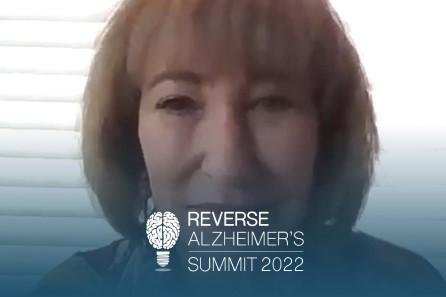Join the discussion below

Dr. Heather Sandison is the founder of Solcere Health Clinic and Marama, the first residential care facility for the elderly of its kind. At Solcere, Dr. Sandison and her team of doctors and health coaches focus primarily on supporting patients looking to optimize cognitive function, prevent mental decline, and reverse... Read More

Dr. Austin Perlmutter is a board-certified internal medicine physician, a New York Times Bestselling Author and researcher. He received his medical degree from the University of Miami, and completed his internal medicine residency at Oregon Health and Science University. His focus is on helping identify and resolve the biological basis... Read More
- How to rewire your brain for a healthier life.
- The role of psychedelics in brain health.
- COVID impacts and your brain.
Heather Sandison, N.D.
Welcome back to the Reverse Alzheimer’s Summit. I’m your host, Dr. Heather Sandison, and I’m so delighted to have Dr. Austin Perlmutter here with us today. He is a board certified internal medicine physician, a New York Times bestselling author of this book ‘Brain Wash’ and he’s also received his medical degree from the University of Miami, completed his internal medicine residency at Oregon Health, Oregon Health Sciences University. And he’s focused on helping identify and resolve the biological basis for stuckness in the body and brain using lifestyle interventions. He lectures internationally on the subject. He hosts Get The STUCK Out podcast and he’s co-producer of the Alzheimer’s: The Science of Prevention docu series. His work on immune mediated depression can be found in the peer reviewed medical literature, and his writing is featured online in Medpage Today, Doximity, KevinMD, Medium, Psychology Today and mindbodygreen. He currently serves as the Senior Director of Science and Clinical Innovation at Big Old Health. Dr. Perlmutter, welcome.
Austin Perlmutter M.D.
Heather, thank you so much for having me.
Heather Sandison, N.D.
So let’s jump in to this idea of how our brains are wired. You know what we see here clinically, what I see working with patients who have dementia is that it’s really challenging to implement changes in our lifestyle. And a lot of that comes from the wiring of our brains. So let’s just get it out there. Can we rewire our brains?
Austin Perlmutter M.D.
It’s a great place to start. And I would say the answer is definitely yes, but a qualified yes. So what neuroscientists have shown is that we are changing our brains throughout our lifespan. And so that means every second of every day, you are rewiring your brain, whether you want to or not. However, the speed of that wiring does seem to change as we age. So when we’re children, especially right after birth, we are rewiring our brains at an incredible rate, millions of new connections per second. We’re also going to be continuing that rewiring over the course of the lifespan, but it just doesn’t happen as quickly. So what I would like for people to understand is, there’s no way around this. We’re constantly rewiring our brains, but things tend to become a little bit more rigid as we get older. One thing that I think many people do not understand is that we can either direct this wiring, meaning we can have a plan for how our brains get rewired, or we can allow that rewiring to kind of occur by whatever is near us, by whatever influences are nearest to us. So if those are good influences, great, and if they’re not, well, that’s not so good for us. But the empowering message is, yes, we can rewire our brains. We can do that throughout the course of our lifespans.
Heather Sandison, N.D.
Wonderful, so this gives us choice in the matter is that what I hear you saying. So through mindfulness and what are other tools like what helps us, I hear that you’re saying that we get more, we’ve all probably seen that older person who’s very stuck in their ways. And so maybe it takes a little bit more heavy lifting to rewire the brain as we age. What are some of the tools that we can use to do that?
Austin Perlmutter M.D.
Yeah, I think, you know, fundamentally everything we do and take in is rewiring our brains. From the food we eat to the media we pay attention to, to the conversations we have with other people. And you could go through and kind of systematically say, is this wiring my brain for joy, for better health or is it wiring my brain for negativity, for anger, for stress? And I do think that is a helpful exercise. But I also think it’s important to kind of pull out a couple of easier ways and faster ways of helping us open up those free wiring pathways. So, one that I really like that you’ve alluded to is mindfulness. I think what mindfulness does and, and meditation, I would kind of say is a form of mindfulness, here, is it enables us to kind of get away from having our programming hijacked and gives us insight into how our brains are operating in real time. So why that’s important is because now we can start to see how things are happening behind the scenes, behind the curtains.
And if we realize that we’re constantly being dragged into stressful thinking, now it’s an opportunity to consciously change that process and really to consciously change the wiring of our brains. There’s another or many other ways we can do this. For example, I think exercise is an amazing opportunity to wire our brains for the better. We can talk about the technical aspects here, but what’s really cool about exercise is that it increases blood flow to certain parts of the brain like the prefrontal cortex, and it increases levels of a protein called BDNF. And I’m sure that’s a big topic in this summit, but BDNF literally helps us to form new connections between our neurons. So anything we can do that positively augments our BDNF levels of which exercise is probably the best thing is going to enable kind of a more rapid rewiring of the brain.
Heather Sandison, N.D.
So, you have mentioned that tomorrow’s brains are represented by today’s actions. So, exercise is one of these pieces. Mindfulness is one of these pieces. What are other things? What other decisions that we can make today that will help us have healthier brains as we age?
Austin Perlmutter M.D.
Yeah, the one that I recommend for people to start with is actually sleep. And the reason for that is, I think many times people are saying, you need to change your diet. You need to start exercising 30 minutes to an hour a day. You need to make big changes that aren’t going to be fun. Because often getting rid of the sweetened food, even though it’s good for you, there’s a reason we eat those sweet foods, we enjoy those sweet foods. And often the reason we’re not exercising isn’t because we want to, but we didn’t get around to it, but it’s just not so enjoyable for all of us. On the other hand, I think most of us, I know myself included, enjoy the feeling we get when we get a good night of sleep. So, why that’s so incredible is that sleep is one of the most powerful interventions for changing our brain function. If you get a good night of sleep, you can literally see the changes on a brain scan the next day.
But, we kind of know this already, right? How do you feel when you’re sleep deprived? You’re not energetic, you’re not thinking great. We tend to make worse choices. We tend to actually gravitate towards unhealthy foods. So I see sleep as really the best spot to start because it’s enjoyable. You will definitely feel better and you can start to make the connection with what is happening within your brain, which is in many ways related to these things that we’re describing. So by the way, sleep issues are correlated with higher risk for a number of conditions, mental health conditions, for sure, but also Alzheimer’s disease. So we’re really looking out for our long term brain. And one of the reasons we do this is it’s immediately changing our brain function that next day, so that it works at a higher level.
Heather Sandison, N.D.
I love it. Do you have any great sleep hacks for how to either get to bed on time or get better sleep for those who are struggling?
Austin Perlmutter M.D.
Yeah, there are a number of these, I’d say the big one is don’t keep your phone in your bedroom. If the phone is in the room, you’re going to be checking it, last thing before you go to sleep, first thing when you wake up. And I think it’s just, it’s distracting. Helping your brain wind down at the end of the day is the goal. And if you’re on your phone, it’s really hard for your brain to say, it’s time enough is enough and I am winding down. So, I think don’t use your phone as your alarm clock. Don’t keep your phone in your room. People will say, oh, well it is my alarm clock. Alarm clocks are super cheap. You know, you can go to a thrift store and buy for $5. It’s a great alarm clock. There’s no reason in these days that the phone has to live in the bedroom. So that’s a very basic one. But some of the other ones that I really like are trying to reduce other media exposure in the hours before bed, especially stressful media, don’t watch the news before bed. But the one that I’ve been experimenting with lately is cooling off the room for sleep.
So this is an interesting one. It turns that our bodies naturally cool off when we go to sleep. And so cooling off our environment may actually promote better sleep. This is research that I’ve heard Matthew Walker, Dr. Matthew Walker talk about live and also has been substantiated in the medical literature, but it it’s can be as simple as just lowering the temperature in your room a few degrees, if you’re on air conditioning, maybe considering opening the window and there’s not gonna be a certain temperature, I’d say works for everybody. For me, I find around 64, 65 tends to work pretty well. And I definitely see the difference when it’s cool in the room, I tend to fall asleep pretty well, stay asleep. When it’s warm, I’m awake a lot of the night and I don’t feel as rested.
Heather Sandison, N.D.
What great ideas. So you make this point that it’s not just about willpower and blaming ourselves. So I see this so often with patients like they really want to do it all. And what we see is that we’re most confident in their progress of reversing dementia, if they can do it all, right. So I always encourage that. But then there’s this tension between pushing too hard and just like that fight to, to get it all in and have that willpower and then getting hard on yourself. So break that down for me a bit. What works for behavior change?
Austin Perlmutter M.D.
Yeah, it’s a tough question to answer, but I usually start with this, which is, if you had pain in your knee, you would probably think there’s something wrong with my knee and you would consider what is happening inside and that’s where you would focus your efforts. But when we make bad choices, we don’t think to ourselves, that is a rough reflection of what has happened in my brain. Instead, what we do is we blame the person for a quote, lack of willpower, for a character deficit. And that just doesn’t make any sense biologically. Because again, our decisions just like our mood, just like our cognition are a reflection of what is happening within our brain. So I think instead of pinning all of our, you putting all of our chips on this one spot, which is hoping people can have the motivation and willpower to see something through what we should be doing is asking how we can program our brains to make the healthy or the good decision, more likely to happen.
And so what I tell people is we need to get away from this idea that you can consciously force yourself to make good choices all the time. You need to get your unconscious brain on your team. And a great example of how this works is habits. So it turns out that habits may actually account for around 40% of our choices in a given day. And there are a lot of other choices we make that are unconscious. What makes habits pretty unique is that we know what we you to program them in. When we do things consistently in the same way, in the same place, time after time, again, it tells our brains, this is something that we need to offload from our conscious brains to our unconscious brains.
And so you can think about other things and you don’t have to think to yourself, am I doing 20 brushes on my bottom right, and 20 brushes on my top left? Instead, you’ve outsourced that to your unconscious brains. So, what most people don’t understand is we form these unhealthy habits and those are driving a lot of our unhealthy behaviors. And we can’t consciously just force ourselves to do those things differently. We have to think through how habits are formed, and then we need to reprogram those habits. And that’s just one example, but I think the fundamental idea here is that we need to move away from a willpower and blame centric model and towards an empathy and biology driven solution.
Heather Sandison, N.D.
Yeah, we see this a lot with even like addiction, right? We, we blame people and again, it’s a character flaw when really many of those people, if we can turn towards compassion and say, oh, like, they’re just looking to self-medicate, they’re not comfortable in their own skin. The other, the solution I hear you coming up with here too, is like start small, like start with something that’s doable.
Austin Perlmutter M.D.
Hundred percent.
Heather Sandison, N.D.
Like sleep. Yeah. And then it starts to snowball into better and better choices.
Austin Perlmutter M.D.
I think that’s absolutely right. And it’s not just start small, but start with something that you actually want to do. Where I see a lot of people go wrong is, it’s new year’s, they say, I’m going to make this resolution. And yes, they start big offs. And but let’s say they start small and that’s starting small is, I’m going to force myself to do blank every day, whether it’s, I’m gonna do 20 pushups in the morning, or I’m gonna eat a kale, a bowl of kale for dinner every day. If you hate it, you are not going to form those habits. And the reason is, number one, you’re not getting the dopamine reward, which helps to embed things in place. But also every day that goes by, you are going to be very upset that you have to accomplish this task. So it’s going to make it harder for you to be consistent and remember habits require consistency to form. So, this is a key part of the puzzle is to do something that is inherently rewarding.
So if it’s maybe who actually do want to do those pushups, do something after that, that is rewarding. Even as BJ Fogg, who is a prolific kind of author on these types of things will say, have a little celebration after you accomplish the task. It tells your brain, this is something we’re celebrating. And so it helps to embed those neural circuits and makes it more likely that tomorrow you will continue to do this. Because the other piece of this that I think people don’t understand is it takes a while to form new habits. You’re not forming new habits in a few days. It takes a couple of months on average to really solidify these things. So, it is a long game and it’s a long game where you’re looking out for, how do I make it the most likely that tomorrow’s self is going to want to do this thing?
Heather Sandison, N.D.
I see people when they’re in transition, like they’re either moving or they’re retiring.
Austin Perlmutter M.D.
Yes.
Heather Sandison, N.D.
That’s such a great opportunity to start forming new habits because there’s a change again in how their life is set up or even a vacation and coming back and saying, okay, when I get back and new years, I guess comes up as well, but there’s this moment where you commit to the shift.
Austin Perlmutter M.D.
That’s right. And I had the opportunity to speak with Dr. Wendy Wood, who is one of the world’s foremost experts on habit change. And this is something that she brought up in our conversation, which is, we have in essence these window periods, and I guess that’s kind of borrowing a term from virology, but that we have these opportunities where things are a little bit more in flux and you brought up moving, that’s a great example, or maybe you’ve changed your relationship status, or maybe you’re taking on a new job. The point is your brain is more receptive to making new habits because things are being shaken up. So those are excellent opportunities to think through how can I form a better habit than the one I had before? Because another key to this process is you can’t necessarily get rid of habits, but you can replace them. And so you can think through if this is what I was doing before, how can I replace this with something that will be better and then go through the motions to make that more likely.
Heather Sandison, N.D.
I love it. So for the nerds out there, let’s talk through the brain chemistry of decision making and habit forming. You’ve mentioned dopamine already. What are some of the other neural connections and the neurotransmitters that are really influencing this?
Austin Perlmutter M.D.
Yeah, well, you know, you brought up the opportunity to be nerdy. So let’s go ahead and do jump in. I will be honest, that decision neuroscience, which is really what we’re talking about here is a complicated field and it’s something we’re still learning a lot about. There’s actually a new field called neuroeconomics. That really is decision neuroscience from the level of the neuron all the way up to how this shapes our kind of social interactions. But I’d say of all the things you can kind of focus on, the framework that I like to go with the most is thinking about how our choices reflect kind of integrations of circuitry between different regions of the brain. And what has been pretty consistent in the research is that in order to have a reflective choice where we weigh the and cons of a decision that turns out to be really important, by the way, to making healthy choices, we need to have access to an activation of what is called the prefrontal cortex. And so, there are many regions of the brain. The prefrontal cortex is the region that sits right behind the forehead. And it’s part of the cortex, which is kind of the outer shell of the brain. And the cortex is thought to be one of the more kind of high powered evolutionarily evolved. It’s a little redundant. Evolutionary recent areas of our development that is critical for again, that higher level thinking.
And so having activation of and healthy activation of this prefrontal cortex is thought to enable us to pause before we make a choice. It’s, what’s in charge of what are called executive functions. And so, the prefrontal cortex is thought to exert what is called top down kind of oversight, which means it helps to regulate other parts of the brain that have that reflective capacity. Parts of the brain, like the limbic system that might be a little bit more impulsive. So to get to the level of some of these circuits, what’s thought to be the case is that you want to have good interaction or healthy reciprocal interaction between this prefrontal cortex and areas of the brain, like again, the limbic system, the base of ganglia that are responsible for more emotional processing, habit formation and those types of things to enable you to have the chance to pause before you’re making choices that might otherwise have gone south, but also to enable a kind of integration of that emotional circuitry. So, for example, anger or stress or fear, don’t ride your healthy thinking, leading you to make poor choices.
Heather Sandison, N.D.
And mindfulness we know a lot about that, right? With meditation the point of it, some people would argue, is to extend that gap between the trigger and then the response so that we have more decision making capacity. So that the second the X calls or the school calls to tell that you, that your child is doing something they shouldn’t be doing, you don’t start binging on sugar, right? So that, that trigger response gap is wider. And then I think that’s a lot of what you’re describing, right? We can make better decisions when we have more space to make them.
Austin Perlmutter M.D.
That’s right. And at the level of kind of some of these neural circuits, what seems to be the case with mindfulness is that it helps to integrate aspects of this limbic system specifically in area of the limbic system called the amygdala, which is really big in emotional processing with regions of the prefrontal cortex, like the medial prefrontal cortex, which is kind of right dead center there. And why that’s important is because if you don’t have kind of this good interaction there, it’s proposed that the emotional circuitry can override your thinking. So exactly what you’ve just described. And I think it’s fascinating that studies on meditation, mindfulness have shown that you can kind of increase the connectivity or improve the connectivity between these two regions of the brain with these actions, with mindful practice, with meditation, that it does seem to lead to changes in the brain, which you can see certainly in very experienced meditators. But also what I found very interesting is an intervention, where they have people practice mindfulness and meditation, mindful meditation, actually to make it a little bit more confusing, is associated with increased connectivity between those regions of the brain.
Heather Sandison, N.D.
Wow, that’s so neat and so we can measure this.
Austin Perlmutter M.D.
Exactly.
Heather Sandison, N.D.
When, some of the things that you have described, you know, these reward kind of response systems and pattern recognition, and then habit formation. The modern world is really designed in a way that makes us as unhealthy as possible in a lot of ways, right? In terms of what food is available and what, you know, what gets advertised and put in front of us in terms of how much we’re in to sit in terms of where we spend our time, you know, scrolling through social media. I want to talk a little bit about that because I think this is another thing around blame and willpower, right? When the whole, sometimes what we’re talking about is just a reflection of a sick society, right? So it’s not your fault, but really the cards are sort of stacked against us in our modern world. I know that you’ve written pretty extensively about this. So I, you know, I wanna hear from the expert.
Austin Perlmutter M.D.
Yeah, so I think that’s right, I totally agree with what you’re saying. In many ways, it’s worse fish swimming in a polluted river and being blamed because we’re developing diseases related to the pollution. And this has been, you know, kind of stated by many people, but the bottom line is we have this, our default state, our default reality is, it’s not one that promotes health and everything from the food choices that are made most available to the media consumption that we’re kind of told that we have to pay attention to, to the way our interaction to move to these unrealistic social media portrayals of our lives. It’s really not designed for wellness. If you look at what the primary indicators of success for country are, I would say GDP is interesting, but it’s not exactly in line with what I would argue matters most. It’s not, you know, happiness, it’s not feelings of fulfillment. And so I think it’s really just, we’re optimizing our society. We’re optimizing really the planet at this point to outcomes that are not in sync with health. Understanding this fundamentally is really helpful. It has been for me because I appreciate that I’m up against the lot that if I go to a restaurant that if I go to interact with other people, I will be seen as weird because of my choices.
I will be seen as the weird person who is asking, whether there’s sugar added to, you know, a steak. I will be seen as the weird person who’s reading the label on the salad dressing or the weird person who’s saying, you know, I have to get to bed, it’s, it’s getting late and I really value my sleep. But again, if you appreciate that the default state that most of us are operating in is one that promotes poor health, disease, then it doesn’t seem weird to say you have to do something different. So I say, you know, that’s the type of weirdness that we all need more of because if we continue to do what everyone else is doing, we have to expect to get the same outcomes that everyone else is getting. And most people have chronic and largely preventable diseases. Mental health has dropped off a cliff. That is what we should be expecting unless we make a change.
Heather Sandison, N.D.
Well, this is a great argument for creating communities of weirdos that are health focused, right?
Austin Perlmutter M.D.
I like that, yeah.
Heather Sandison, N.D.
And so in the context of Alzheimer’s, society is set up, like you said, that mental health has dropped off a cliff, and we know that depression and anxiety set us up for higher risk of dementia. Do you have thoughts? Well, one I’d love to hear, you know, kind of the brain connections of that. Like, how is that happening? Why does that happen? And then I know that a lot of what you’ve already discussed is what to do about it. But if you have any other insights, particularly in the context of Alzheimer’s, I’d love to hear, yeah, those connections between mental health and dementia.
Austin Perlmutter M.D.
Right, so as you’ve said, the connection mental health and dementia is a real one. And it’s something that I’ve been very interested in that, like a kind of primary area of interest in research is in this stuckness, is how the brain and the body gets stuck. I see depression fundamentally as an example of the stuckness. And I do see that it progresses to many diseases of which one is Alzheimer’s. So, there was an article that was published actually just in December of last year in the journal, Biological Psychiatry. And it was called genetic evidence supporting a causal role of depression on Alzheimer’s disease, which is kind of a bold statement, right? Causality means something causing something else is a big deal to even implicate that in the medical literature. But they use this new kind of research technique called Mendelian randomization, which is complicated to explain, but the fundamental, the basics of it are that you can control for variables that you couldn’t before. And you, you can show stronger connections than you used to before.
And what the researchers showed in this study is that there appeared to be shared genes involved with Alzheimer’s and depression. And then what they also showed is that when they looked at directionality, meaning, did it seem like depression caused Alzheimer’s, Alzheimer’s caused depression, they found evidence for depression leading to Alzheimer’s, but not the other way around, which I thought was interesting. Because we’ve known for some time that there is this connection between people with depression being at a significantly higher risk of developing dementia, but it hasn’t been as clear as to whether there are confounders, you know, maybe it’s people with depression eat junk food, and that increases risk for dementia. And now it really does seem like there is a stronger direct link between those two things. But then getting to perhaps some of the mechanisms there, which I think are, are really fascinating. So one comes to the decision making piece that I just alluded to, which is that depression is associated with a number of changes in the way we think.
One of those has to do with making more impulsive choices. And so there are a number of ways this can be measured, but the bottom line is that there’s evidence that in depression, we tend to make more impulsive choices. We just said the world is set up, so that the easy choices are bad for us. So, if you’re making more impulsive choices, you’re going to eat more junk food, you’re not going to exercise. We know that, you know, kind of challenges in getting ourselves motivated is kind of a key factor in depression. But what really gets me interested is looking at some of the brain changes that are in sync between depression and dementia, specifically Alzheimer’s disease. Because, and again, we can get as nerdy here as you want. There are a number of things, that tend to be seen in Alzheimer’s disease. One of which is elevation and inflammation, activation of what are called these microglial cells, which are these brain immune cells.
And, this is something that has also been described in depression, where we know now that having elevated inflammation translates into an increased risk for depression, where we know that people with depression, when you measure their blood, they tend to have higher levels of inflammation. And that inflammation actually predicts lower response to many treatments. So, if we think about inflammation as a potential driver of dementia, especially Alzheimer’s, decades down the line, and we know that depression is a condition, that many cases is characterized by higher rates of inflammation. You can see how the inflammation, which is basically an imbalance in the immune system might be one of the central themes, linking these conditions together. The other one I’ll just touch on because there are many is issues with neuroplasticity.
So we talked about this before, as it relates to brain wiring, neuroplasticity, the idea that our brains are constantly being rewired each moment, every day, as a reflection of what is going in and in both depression and dementia, again, specifically Alzheimer’s, you can see issues with neuroplasticity and those relate to levels of BDNF, which are lower in Alzheimer’s and are lower in depression. And then you can think about what is some of the circuitry that is involved. So what’s happening at the level of the neuron. And I’m gonna pause here before we get into too much more detail. But bottom line here, tons of overlap in some of the bio pathology, or just the pathways that have been implicated in both depression and in Alzheimer’s disease, not to mention just the fact that depression is related to making potentially more impulsive and less healthy decisions. And we know that making decisions that are healthier around food may help prevent a Alzheimer’s, whereas the opposite is also true.
Heather Sandison, N.D.
So you’ve mentioned depression a lot. What about anxiety?
Austin Perlmutter M.D.
Yeah, so my focus has really been in depression and there’s different brain circuitry that seems to be involved in anxiety versus depression. And I’d say the, you know, thinking about, let’s say the inflammatory connection, it hasn’t been all established in anxiety. I’ll also say that, just like depression, there are a number of conditions under the subheading or under the heading of anxiety. And those can range significantly in how they are presented. So PTSD, I think technically is no longer an anxiety disorder, but it has many features of anxiety. and it’s actually characterized by an increased activation of that limbic system and a decrease in the connectivity between the prefrontal cortex and the limbic system, especially the amygdala, as well as the increased inflammation. But generalized anxiety, I think you go more down the stress pathway. So that then gets us to another conversation about the relationship between Alzheimer’s and something like stress, which we throw out the term stress, what we’re really talking about here is a dysregulation in this complex series of hormonal cascades, which we call the HPA sympathetic access, right? And so high levels of stress appear to be toxic to neuroplasticity.
High levels of stress have been associated with an increased risk for dementia. Stress does correlate with an increased risk for depression, a significantly increased risk, but also stress seems to be one of those kind of key pathways that predisposes to anxiety. And there’s a lot of overlap between high stress and more anxious states. So you can kind of back into this, however you want to. But I think what I pay a lot of attention to is trying to look upstream. And so we know that dementia tends to be one of these conditions we don’t think about until it’s too late. You know, probably people like us at around our age, aren’t spending too much of their day worrying about dementia and people in their forties and fifties probably aren’t as well unless they have a family member or unless they’re doing this, seeing patients with dementia. And so one of the reasons it’s so challenging to pay attention to is because it’s just thinking about the future. And as I’ve been saying, we’re having a harder time doing it these days, really thinking about the future.
And so what we need to do is look at signals, signals that are telling us we might be at an increased risk for these conditions that we can get people to pay attention to. And I am all about the mental health piece. I think mental health in and of itself is worth a ton of attention. But if we could say, Hey, listen, you know, you’re having these depressive issues. This might be important, not just because we need to deal with your mental health, but also because it might tell us something about your long term brain health that might motivate us to pay more attention to interventions, whether that’s pharmaceutical or lifestyle, to try to target some of those pathways that are involved with depression, for example, that might predispose us to Alzheimer’s disease.
Heather Sandison, N.D.
That’s, what’s so exciting, I think about this conversation is that so few of us think about what’s gonna happen as we age, because it’s kind of in that box of that’s never gonna happen to me, until it does. And there’s not really a compelling future around it. Again, society is set up where we don’t really value our elders the way maybe some of our ancestors did or some cultures do. We just park them in senior living facilities, where they eat cake and ice cream and watch TV. And nobody’s excited about that. But sharing this message that there is hope around dementia, that there is a different way that we can sort of reimagine aging where we can have long, healthy lifespans where we’re enjoying our great grandchildren. That kind of thing I think is just really exciting and I’m so grateful to have you joining me on this conversation. You and I are both in our thirties I think, and we are. So it is kind of, you know, this isn’t the sexy stuff that a lot of young doctors get into, but it’s so exciting because I think it does change. I mean, there’s a tsunami of people coming our way, with dementia as the baby boomers age. And this will change society. I mean, it will bankrupt Medicare, if we do not do something quickly. How did you become particularly interested in this? What’s compelling about it for you?
Austin Perlmutter M.D.
Yeah and so, as you’ve said, people in our age grew group probably don’t care about this. I see it as really this black box where, you know, you’re, you’re young, you’re healthy and you’re not paying any attention to what’s happening in your brain. And then all of a sudden it’s, oh my gosh, am I losing my memory? Am I losing my cognitive function? And then now you start looking in and wondering what’s happening in your brain, but there’s this huge period, really all the way up until you hit those symptoms, that there’s just no concern whatsoever. I mean, you know, college, college kids.
Heather Sandison, N.D.
Do the most about it, right?
Austin Perlmutter M.D.
That’s exactly it. That’s what I’m, I’m thinking even back to what it was like when I was in college. And nobody’s thinking about the long term effects of binge drinking, which is still super common, it’s just kind of what you do because it’s fun and you’re resilient. And I think it’s just, it’s kind of a, a thousand paper cuts, right? You’re building over time, your future brain. And then all of a sudden you realize that there’s a problem and people need to appreciate that, even conditions, like let’s say a stroke, which happens all at once and you might have a significant drop off in cognitive function that that could have been building for decades as a reflection of the vascular system of your brain, which is a reflection of the immune system of your brain, your hormones. So we really are getting to direct our future selves today. But to your point as to why I care about this. So I’ve, I’ve always been interested, in trying to understand kind of like how human behavior translates onto our decision making and how that translates into disease. I have family history of Alzheimer’s disease, which obviously is very challenging and you know, more challenging still by the fact that my dad has basically dedicated his life to figuring this out. And it’s not like there are any great solutions.
So you really find yourself saying, I mean, in my case, like if my dad can’t solve this issue, I mean, granted, he’s my dad. So I have probably an unrealistic expectation for what he can do, but he’s also been a neurologist, in this field for a long time. If he can’t figure this out, then it really is something that we need to be paying attention to way earlier, in the preventive stages. But also there’s a family history, right? I am predisposed to be at a higher risk because I have had multiple family members develop Alzheimer’s disease. The other piece of this though, and really what kind of galvanized my efforts over the last five or so years was my time in my clinic in residency where I was so unsuccessful at changing behavior, because I thought all I needed to do was tell people what to you differently and they would do it.
That the solution to solving health was simply knowing the information. And I’ve been proven wrong time and time again, the medical literature would prove that wrong time and time again. And so it was trying to understand what it was that actually drove behavior and how we could change that behavior that made me interested in the brain and what goes wrong, what gets us stuck. And then it was kind of the natural progression to saying, what are those stuck conditions and what is the pathology in the brain and how can we both prevent and ideally reverse it. And so, you know, Alzheimer’s is a prototypical example of how things go wrong due to a buildup of injury that happens over the course of our lifespans, that is a reflection of our lifestyle inputs. And there’s gotta be a better way to bridge that gap. So we don’t wind up where so many people do, which is, I never thought about it until today.
Heather Sandison, N.D.
So, for anyone who wants to understand more about what Dr. Austin Perlmutter is up to, there’s this book ‘Brain Wash’ that he wrote with his dad, Dr. David Perlmutter and Austin, you also have a newsletter so that people can keep in touch and know all of the exciting things that you have going on. Can you tell people how they can sign up for that?
Austin Perlmutter M.D.
Sure. If people go to my website, which is just austinperlmutter.com, you can find it there. And if you’re feeling so specific, you can do a back slash on the end and say backslash newsletter, and it’ll take you directly to the signup. But the point there yeah, is just, I find myself doing a lot of different things and, you know, I will sometimes post on social media, I will do conferences, but I found it’s much better to be able to address people’s concerns in the newsletter. So when people are sending me questions, I’m able to actually think about it for a while and type some thoughtful responses up as well as sharing the content that I’ve created.
Heather Sandison, N.D.
There’s another exciting kinda topic I wanted to, before we go, I wanted to touch base on. You spoke at A4M recently where we met briefly, and you were speaking on the topic of psychedelics and I think more in the context of mood, but there’s also some preliminary and exciting research around dementia. So would you share your thoughts there with our audience?
Austin Perlmutter M.D.
Yeah. You know, this is a topic that I, for the majority of my life would’ve been uncomfortable speaking about at all, let alone doing a lecture on it. And I think it’s just a testament to impart the fact that there’s so much interesting research happening about psychedelics right now, and also that when we look at what else might work to get us unstuck, the solutions are just, they’re not really there. So I see psychedelics as a very promising intervention for helping us unstick our brains. And primarily the research has been around mental health. But as you said, what is fascinating is that people are starting to look at these molecules as potential interventions for a wide range of conditions, including Alzheimer’s. And there was actually a paper that came out in Frontiers in Synaptic Neuroscience in August of 2020, that was called ‘Psychedelics as a Treatment for Alzheimer’s Disease Dementia’, which I think just the title alone tells me that there’s something happening here. One of the things that I think people really should appreciate is that psychedelics, you know, yes, there is these subject active experience, that’s the one that everyone seems to focus on, which is you have a trip, right? Your mind is altered. But that is a reflection of changes in our brain.
Just like I was saying before, how we think and how we act and how we feel that is a reflection of changes in our brain. And so it’s clear that there’s something happening that is causing us to feel altered states of consciousness with psychedelics. And one of the things that might be happening is that it is promoting the rewiring of our neurons, so neuroplasticity, and it may also be promoting changes in the immune system in the brain. It may actually overall be lowering neuro inflammation or inflammation in the brain. So, let’s think about this in the context of Alzheimer’s disease. One of the kind of key pathologies seems to be a lack of healthy neurons and a lack of neuro connections in parts of the brain, like the prefrontal cortex, as well as the hippocampus, the memory center of the brain. And what’s really interesting about psychedelics is that they appear to increase BDNF, that protein we’ve been talking about that appears to be key to neuroplasticity.
It also seems like it’s key to neurogenesis, which we haven’t really talked about, but is the creation of new neurons, which unlike neuroplasticity doesn’t seem to be a huge driver of how our brains change over the lifespan, but it does happen in our brains throughout the course of our lives. Researchers have shown that even in older people’s brains or the elderly, there’s still new neurons being created specifically in a couple of regions, one of which is the hippocampus, the memory center of the brain. So, it’s really cool to see, there are a couple of human trials showing that even small doses of psychedelics, micro doses, increased levels of BDNF, and there have been a number of animal trials and certainly, a bunch of really interesting cell level trials that show that neuroplasticity is promoted by psychedelics.
So there’s a lot of things that are being done here. I always kind of make the caveat to these conversations, which is, I’m not telling people that they need to go out and use psychedelics to fix all of their problems. But the point being that we have largely viewed these molecules as some sort of a recreational fun drug that causes this trippy experience. And the truth of it is we’re seeing that these are powerful modulators of our neurochemistry, which we should have known because obviously they’re changing our subjective experience of life, but that these effects on our neurochemistry may actually be beneficial to a number of processes, yes, mental health related, but also neurodegenerative conditions are possible too.
Heather Sandison, N.D.
It’s so exciting and so hopeful, right? In some of these key words that you mentioned around neurogenesis, neuroplasticity, that’s what comes up a lot around these psychedelics. So, there certainly seems like there’s a place for them in this conversation. And I’m excited to see what you know, that we’ll get to see what the future has in store here as the science progresses, while we’re on this at of things we don’t always talk about, you published a behavior about COVID. And I think there’s some interesting pieces that really apply to the dementia space and people who are suffering, even the caregivers around making decisions when it comes to COVID. So would you share what you, so what was in that paper?
Austin Perlmutter M.D.
Right, well, so as we all know, it’s hard to talk about COVID without making half of the population upset. But what was interesting about doing this review paper was I had a chance to dig a little bit deeper, you know, beyond the politics, beyond what you’re seeing on the news and ask about what is the bigger implication of what we’ve seen around the world? And what was clear from this is that you have the virus on one hand, which causes infection and causes problems for many people. Some of which relate to many of these pathways, you’ve described like inflammation, but that, which you also have, are a number of changes that have happened as a result of policy from the virus. So as a result of, let’s say lockdown measures, and those have led to decision making changes and led to alterations in the way that people eat food and how much they’re exercising and their social interactions. And, I would say that, I mean, here we are, depending on when you listen to this, we’re at the start of 2022 right now, you know, certainly most of the world’s population has not had COVID, but I’d say of the world’s population has been affected by the policy measures as a result of COVID. And so when you look at what has happened, people have preferentially chosen to eat more comfort food, which tends to be pretty bad for you.
There have been a number of studies showing that exercise has dropped off, especially you look at the effects on children and how changes related to lives have had negative impacts on their mental health and the like, so a lot of kind of casualties beyond just what we’ve seen from the virus itself. And how does that all relate to what we’ve been talking about? Well, what I propose in this paper, and I think what has been pretty well substantiated by the medical literature is that when we look at how things alter our brain function, and there’s been some indication that COVID itself, the virus can alter our brain function, but certainly an indication that things like changes in our diet and exercise and stress can alter our brain function, that you have a convergence of both the virus and the lifestyle changes that appears to promote more inflammation, that appears to promote more of the stress activation pathways.
And you know, this all kind of gets us to the point of saying, oh, well this is a whole lot of negativity. And is there any benefit to it? The flip side of this is, there are things we can do to offset some of these brain pathways. So if we think about the fact that what we want want to do is minimize kind of the toxic inflammation and stress that goes into our brains. Then, there’s stuff we can do on a daily basis to help promote that. So we can talk about, you know, regardless of your concern for COVID or not, we should be talking about our food. We should be talking about improving our immune systems, independent of anything related to this virus, because immunity is not just about, you know, fighting off a bug. It’s about the state of inflammation in your body.
And that’s something we can do a lot about, through, again, our foods at a very basic level, I am a big proponent of just avoiding processed foods, whenever you can. So just trying to choose foods where you can identify all the ingredients is really important, but also things like sleep, getting a little exercise, getting out into nature, which has been associated with lower levels of stress and may improve our brain function. So point being, if we can all agree that there are these brain pathways that we want to, to keep in good form, then we should be able to agree that there are things we can do beyond just avoiding the virus to help promote those healthy brain pathways. And these are a lot of these basic lifestyle interventions that we’ve been discussing.
Heather Sandison, N.D.
What’s exciting about that, right, is it’s, it’s all the same stuff, right? If we wanna be healthier, if we wanna be protective even against COVID or whatever the next virus is, it’s all about those foundational pieces that you’ve been talking about, we’ve been talking about for the last hour, right? It’s good sleep, it’s getting some exercise, it’s making good food decisions, it’s managing our stressors and maybe getting some meditation, it’s having healthy digestion. And it’s all of these foundational pieces really protect us no matter what comes up, if it’s Alzheimer’s or a virus or depression or anxiety, that’s the most powerful tool. It’s those choices we make each day.
Austin Perlmutter M.D.
It is, and I wish I could say there is a drug or a supplement that you can take, and it’s going to fix all of your problems. But if there was, you would have heard about it already and people wouldn’t be having all these problems, humans, people today, especially we want the quick fix. And if the quick fix worked, then we wouldn’t be in this pickle. So again, I wish I could offer people just a quick fix all. But what I think is really great is that there is this extra level of understanding that we can gain, which is that we can wire our brains for better health. We can be the architects of tomorrow’s brain, and it can be as simple as just giving yourself a good night of a sleep that will compound an interest and make it easier for you to make those other healthy decisions. So you don’t have to go out and change everything, right? You don’t have to go through and only eat whatever health food you like for the rest of your life. You don’t have to exercise for three hours a day. You just have to start programming your brain a little bit to promote those healthier decisions, and then that will compound and make it easier for you to do that in the future.
Heather Sandison, N.D.
Amazing. Dr. Austin Perlmutter, thank you so much for sharing your wisdom, your experience today with us, your time. It’s been an absolute pleasure to have you here. So grateful to be working, you know, to change the narrative around this disease with you. Thank you.
Austin Perlmutter M.D.
I really appreciate as well.
Downloads

